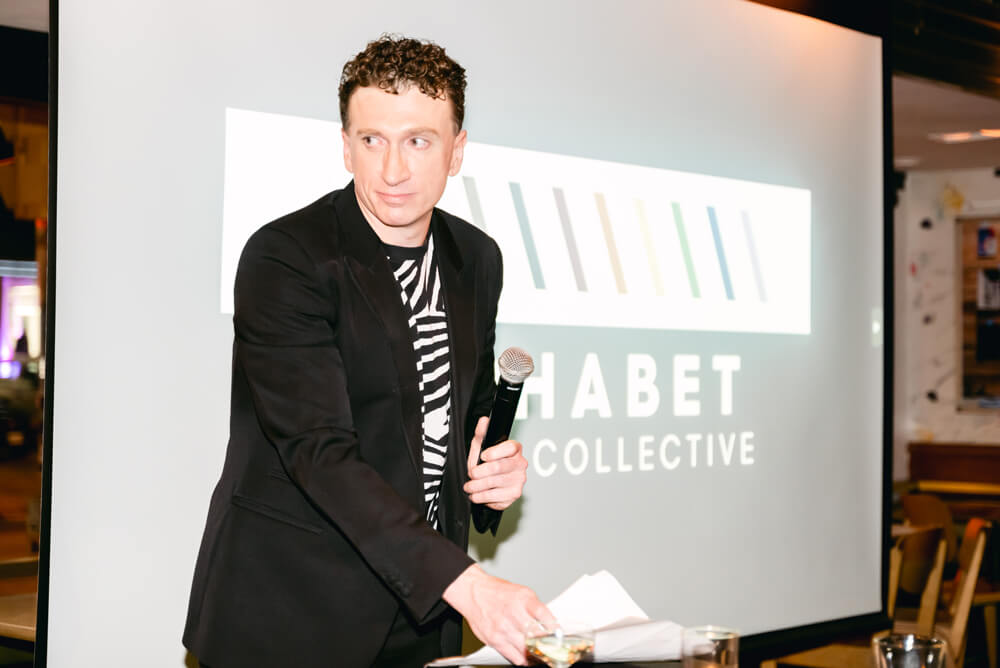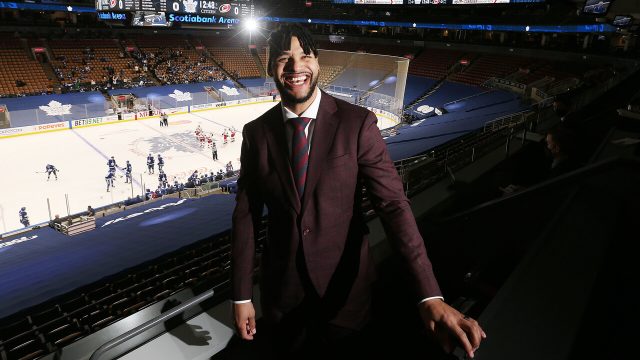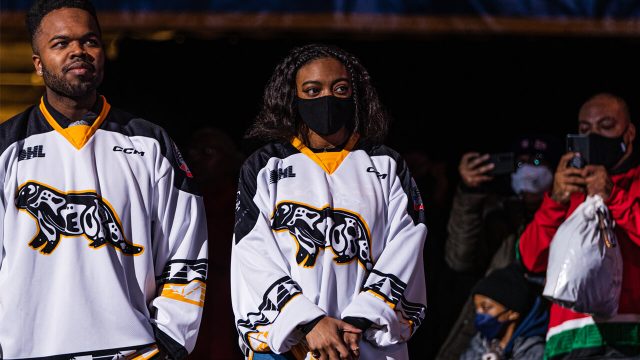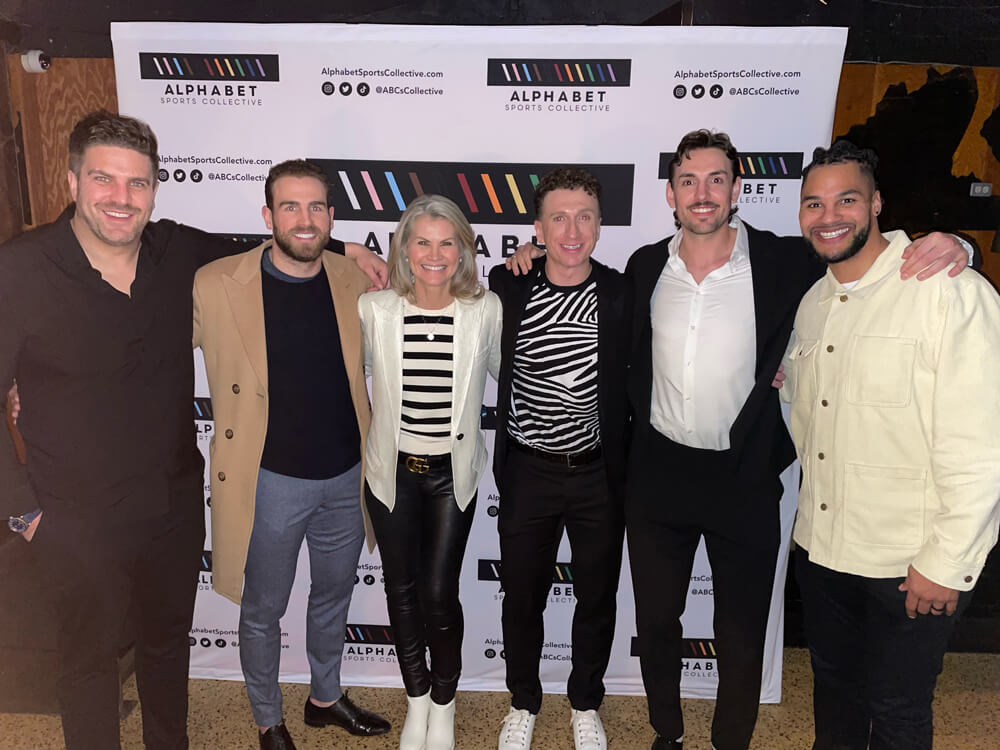
It was feeling the isolation firsthand that made Brock McGillis and Bayne Pettinger imagine another way forward. It was experiencing the loneliness themselves, the lost-at-sea voyage of being a queer person in hockey’s ecosystem, that made them wonder about other possibilities. Thinking back on it now, Pettinger traces their shared journey to search out those possibilities back to a single conversation, when that mutual experience first brought them together.
“I think it started, really, with my coming-out process, which was about two-and-a-half years ago,” he says, “when I reached out to Brock.”
Four years earlier, McGillis had become the first professional men’s hockey player to come out as gay. As Pettinger broke a similar barrier among hockey agents, he sought out the former pro for guidance. It was then the two men first spoke about creating a new space for hockey’s LGBTQ+ community, a seed of the idea that’s since blossomed into the not-for-profit group Alphabet Sports Collective, which launched last month. But before the planning and strategizing and imagining, what stood out most from that first conversation, Pettinger says, was simply the joy of finding community.
“I didn’t really think that hockey was a safe space,” he says of his feelings at the time, when he wondered if the truest version of himself could coexist with the one the hockey world knew. “Being an executive in the game, [I thought] that I couldn’t combine the two. So, Brock was a huge help for me, showing that there can be successful people in the game that are members of the community, you know?
“From there, we sat down and said, ‘Everyone kind of operates in silos — why can’t we bring this queer community together?’”
It all crystallized for McGillis on a night around that same time, when he got his own glimpse of what that ‘together’ could look like.
“It was in the height of the pandemic, and I was hosting a digital drag event to raise money for queer people in Toronto who worked in the Village, who were out of work,” McGillis remembers. “I was just sitting there and I was watching the event, and I just thought, ‘We need a space for queer people in hockey. We need a space for them — not just groups out there, which is lovely. But we need something where they can exist.’ So, I just tweeted: ‘What if I started a not-for-profit for queer people in hockey?’
“It was just a random thought, an idea that wasn’t fleshed out or anything. Four-thousand DMs later, I said, ‘All right, I guess this needs to happen.’”
How to get from that initial idea to the type of organization they had in mind wasn’t immediately clear. “It’s one thing to have a vision and say the end goal is to have a queer, thriving community in hockey,” Pettinger says. “We had to bring in policymakers and people in the not-for-profit space, people with experience in fundraising — you know, it can’t just be Brock and I.”
“I don’t come from the not-for-profit space, so I wanted to make sure — we all do — that it’s not just, ‘Okay, this exists,’” adds McGillis. “That when it’s fully up and running, it has traction and intent and purpose.”
The 10 people they brought in to form ASC’s board of directors alongside them were pulled from all the areas Pettinger mentioned: There were those well-versed in the business sector, like Marco DiBuono (president of Canadian Tire Jumpstart Charities), Bradley Sutherland (national manager of business development for Air Canada), Alison Spitzer (director of finance and operations for Canadian Women & Sport) and Bryan Mills (tournament coordinator for Canlan Sports); a veteran policymaker in Allie Cotter (senior policy advisor for the Ministry of the Solicitor General); and those experienced in pushing back against sport’s outdated norms, like Amanda Schweinbenz (associate professor in Laurentian University’s School of Kinesiology and Health Sciences), Kurtis Gabriel (former NHLer), Samantha Chang (commercial litigator and co-host of The Broadscast podcast), Chanel Keenan (former intersectionality consultant for the Seattle Kraken), and Gabriela Ugarte (writer and co-founder of To Hockey With Love).
After months of planning, of recruiting that board and plotting the course ahead, ASC officially launched in mid-March, announcing itself to the world with an event at Toronto’s Drake Hotel.
And while the launch came against a backdrop of public tension surrounding hockey’s uneven support of the LGBTQ+ community, brought to the fore again by a string of NHL Pride Nights that saw a group of players refuse to participate, ASC’s inaugural event was a sign of something more hopeful: a night grounded in love, support, and respect.
“It was wonderful to see so many people show up,” McGillis says of that night, which counted among its attendees Toronto Maple Leafs players Ryan O’Reilly and Alex Kerfoot, others from the NHL world, and prominent members of the media, among others. “I was looking around the room and saw all these hockey people, and I started thinking about when I came out in 2016, how alone I felt. Hockey at times had been pretty much an oppressive space for me — it was a space that I just hated being in, even though I loved the sport dearly. And seeing all these people there in support, saying, ‘No, we want this to be for you as well as us, and people like you, and the next generation of people coming through the sport’ — I was overcome with emotion.
“I got up there to speak, in front of 200 people, and I was shaking in tears. It was just so nice to see, and it gives me so much hope for where the sport can get to.”
A video screened at the launch, featuring a number of NHL leaders who’ve signed on as ambassadors for the group, made clear just how widespread support for ASC is among hockey’s highest echelon.
“From players to executives — Jon Cooper is on board as an ambassador with Tampa Bay, to Meghan Hunter, who’s an assistant general manager with Chicago, to Morgan Rielly, Tyson Barrie, Scott Laughton,” Pettinger says. “They couldn’t [all]be in attendance, but they are on board.”
It was an important night for the co-founders and their team. Still, McGillis cautioned against revelling too much in the evening’s victory.
“It was a proud moment — a lot of hard work from our board, a lot of sleepless nights — but it was only the beginning,” he says. “We can’t rest on a party. Now it exists, and we have to do more. We have to create more. We have to be working to be that space.”
And so the attention turned from laying the foundation to the path ahead, the work to be done. For McGillis, the map through that wilderness is clear, the starting point the same one he and Pettinger discussed years ago.
“The next step is to build up a community,” he says. “There are so many queer people in hockey, whether it’s players, people working in the sport, fans. We exist, but we are fragmented. We don’t exist in unison, together. We’re kind of all over the place. And because of that, it can be quite isolating and lonely being a queer person in this space. On top of that, we have no true support systems for one another.”
“That’s what we want to do, is just unite the community and show that we don’t have to operate in silos,” adds Pettinger. “That there is a hub where you can feel safe, use your resources, straight or queer, and really accelerate in the game.”
Once that community has been built, the next step is to harness the power that comes with getting out of those silos, of finally sharing space, McGillis says.
“The goal is to get people feeling good, whether it’s through peer support or different programming. Just recognizing that a lot of us have gone through similar stuff in the space, and we all have different tools or ways we’ve coped or dealt with it, and maybe we can help one another,” he explains. “And then as we get people feeling good, let’s give them tools to exist within the hockey ecosystem. It could be playing, it could be coaching, sitting on boards, managing teams — we need seats at every table, because currently we have few seats at [any]tables.
“That alone, just having a presence everywhere, will ensure safer spaces, and will ensure that, you know, we exist there. So, when things happen that aren’t great, we have representation that’s a part of the decision-making. And it should go from the smallest local organization right up to the top leagues in the world.”
Aside from that internal, peer-support work, there’s an outward-facing component, too, a role for all those marquee names who’ve signed on to lend their support.
“We’re onboarding them, educating them. It’s not just a clickbait thing — we’re actually going to educate them so that they can speak on these issues and be a voice, and help them understand what the community goes through and what the community faces,” Pettinger says of what ASC calls its Ambassador Program.
The group is in the process of organizing a Speaker Series featuring those ambassadors, beginning this Spring, to ensure the ASC’s message is spread beyond those who’ve already been paying attention.
“Let’s say I talk on issues — I might be in an echo chamber in a sense. Most people who follow me, follow me because they know what I do and what I’m talking about,” McGillis says. “Whereas when some of our ambassadors put stuff out — whether it’s a Pierre LeBrun or Morgan Rielly or anyone else — well, they have fans who might not engage with the LGBTQ+ community. They have fans who might be oppressive towards the community, but now [those fans]might critically think about what they’re saying and doing, because the people they watch on TV every day, or their favourite hockey player, is [saying], ‘No, I support this.’”
There’s another goal in McGillis’s mind that sits further off in the distance, beyond the timelines of the current work. One they can take on once things truly begin to change and the sport starts to look different than it does right now.
“Once it’s safer, then we can try and get queer youth into the sport. Those kids that are othered when they join today,” he says. “So many kids get to go to the rink, and when they get there and they get in the locker room, nothing else matters — all their stress from parents or school or anything else becomes irrelevant for those few hours. Because they’re having fun in the locker room, they’re playing their sport. … They’re just feeling joy and excitement and they’re so immersed in that moment.
“For queer kids, getting to that locker room is oppressive. So, we need to change that. We need to get it so that it’s a space where they feel good, and it’s a distraction for them too, and they get excited to go the rink. And it’s a place they want to be.”
The hope for McGillis and Pettinger is that, in time, ASC can build something that changes that experience. That by linking together hockey’s queer community, they can create the type of support system for the next generation that they wished they had in their own younger days.
Thinking about what that could look like, about what the sport as a whole could look like five or 10 years down the line if the culture shifts in the direction he hopes it will, Pettinger lays out a vision both simple and undeniably worth fighting for.
“Just [where]everyone’s welcome, and it’s not even an issue,” he says. “We’re not even having these debates over Pride Nights and what’s right and wrong, you know? We’re a couple of years behind society as a whole, sports are, in terms of acceptance and inclusion. But hey, Brock, myself, Luke Prokop, our board, ASC — that’s our mission, to put on the work boots and try and drive this game in the right direction.
“That’s our aim. I know it sounds lofty, but you don’t know unless you try, right?”
For McGillis, that hopeful vision of the future is balanced against another — one that’s more stark, reminding us where the game could wind up if we fall short in the effort to make the sport more inclusive for the next generation.
“Hockey right now in Canada has a tough time recruiting and retaining athletes, especially on the boys’ and men’s side. The numbers go down something like 15 to 18 per cent annually, approximately,” he says. “Which is tragic, because it’s such a beautiful game. But I think it lacks exposure to diverse people, because it is so incredibly insular. … So, we’re not growing the sport. But if everyone can exist within it, the sport will flourish. It’ll be even better than it is.
“It’s already, in my opinion, the best sport in the world. Imagine how great it could be if everyone could truly participate, and take part? If it was a welcoming and open environment for all?”








